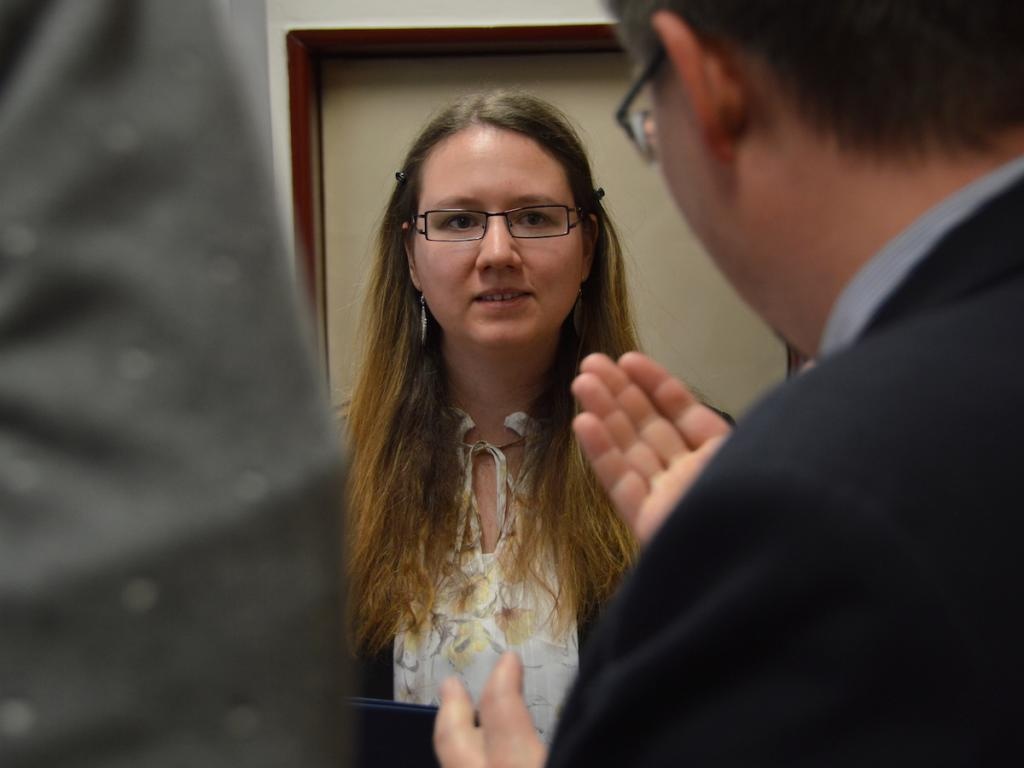She chose to study the LL.M. (Master of Laws) programme, even with no prior legal background. She specialised in International and European Law – taught in English – in which she has long held a keen interest and fully intends to put it to good use in her career. Adela Mekotova, expert translator, took on this this challenge to become the first graduate of the LL.M. programme at the Olomouc Faculty of Law.
“The programme was a pleasant surprise in the way that lessons were made up of small groups. It really felt good to know that all the teachers here were very keen to pass on their knowledge to me. All the lessons were very intimate…” 28-year-old Adela Mekotova praises her teachers. Applicants may choose from four specialisations within the LL.M. programme at the Olomouc Faculty of Law. Further detailed information on the programmes on offer may be found on a special website.

One of the conditions to be admitted to the programme is a university education, bachelor’s degree at a minimum. Where and in which field have you got yours from?
I actually hold two bachelor’s degrees. I studied International relations with a major in English language and literature at Masaryk University in Brno and later English for interpreting and translation at Palacky University. Both helped me tremendously during my LL.M. studies.
Why have you chosen the Olomouc Faculty of Law and the International and European Law specialisation for your LL.M. studies?
The Olomouc Faculty of Law has an excellent reputation with results to match. When I found out about the new programme, I didn’t hesitate to apply. I chose to specialise in International and European law because I’m an English to Czech translator and I specialise in the fields of International Relations, EU and law. The LL.M. programme was the perfect complement to my expertise in translation.
Your case shows that it is possible to successfully study for the LL.M. programme at the Faculty of Law even without any previous legal background. How difficult was it to study with this disadvantage?
For sure I had a handicap at the beginning. But I was always studying, and I’m a diligent student, so it didn’t take as long as I expected to catch up. My previous studies in International relations at Masaryk University were a great help. During the LL.M. Specialisations in International and European Law, we were often hitting on topics I had already gone through at Masaryk University. Back then we were looking at them from the point of view of Political studies but this time round we were tackling them from the legal point of view. I feel that this LL.M. programme can be studied by graduates of a range of similar fields (mainly International Relations, Political Studies, European Studies), not only by graduates of legal studies. And actually, the programme is intended to be like this.
What surprised you during the programme?
The programme pleasantly surprised me by the fact that the teaching was carried out in small groups. It was a big change compared to my previous studies at Masaryk University. I know I learnt a lot more this way. It really felt good to know that all the teachers here were very keen to pass on their knowledge to me. All the lessons were very intimate, and I spoke a lot. As for unpleasant surprises? To be honest, there weren’t any really.
Did the programme meet your expectations?
I was hoping to get some legal knowledge as well as the right English terminology in the field of International law, which would help me with my translations. My expectations have definitely been met.
How long were you studying? Were you working while studying?
The International and European Law programme is designed to last three semesters and I stuck to this plan. And I was able to keep it to three semesters even though at the same time I was still working on my English to Czech translations. I believe it would be possible to work part-time while studying on this programme. Applicants can choose from quite a wide range of subjects so they can definitely put together a schedule that meets their needs.
How are you planning to use your new education?
I will absolutely make use of the new knowledge during my career because I’m a freelance English to Czech translator. I specialise in translations in the fields of international relations, EU, business and contracts. The new legal knowledge I’ve now got means I can deliver terminologically correct translations in these fields.